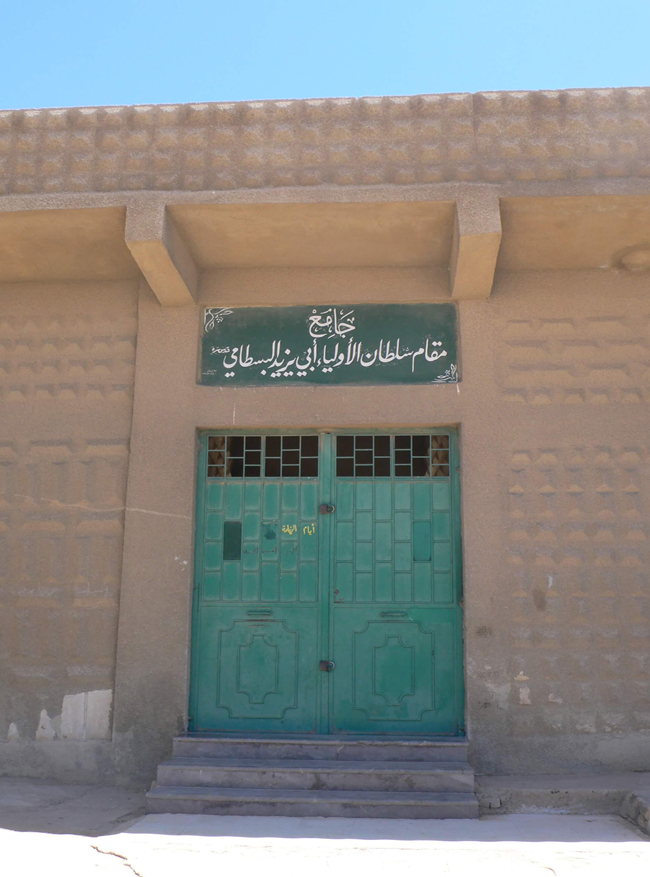-

 Know, the true nature of your Beloved.
Know, the true nature of your Beloved.
In His loving eyes, your every thought,
Word and movement is always –
Always Beautiful.
~ Hafiz
The Golden Chain

6. Shaykh Abu Yazid al-Bistami
Shaykh Abu Yazid al-Bistami (may God sanctify his innermost being), also known as Tayfur Abu Yazid al-Bistami or more commonly known as Bayazid al-Bistami, is the sixth Shaykh in the Naqshbandi Golden Chain, receiving the secret of the Golden Chain from Jafar as-Sidiq. He was from the ‘first tier of Shaykhs’ and is one of the best known of all the Sufi Masters.
Bayazid was born in Bistam in the north east of Persia. His grandfather was a Zoroastrian and one of the leading citizens of Bistam. His father’s name was Tayfur, who like his two brothers, was an ascetic. His mother described the time he was in her womb:- “Every time I put a doubtful morsel of food in my mouth, he would stir in my womb and wouldn’t keep still until I took it out of my mouth.”
His parents initially sent him to school in Bistam, where he was taught the Quran. His teacher was explaining the meaning of a verse from Surat Luqman – “Be thankful to Me, and to thy parents.” These words moved the heart of Bayazid, who asked if he could go home and say something to his mother. The teacher agreed, and when his mother asked why he’d come home, he replied, “I reached the verse where God commands me to serve Him and you. I cannot be a manager in two houses at once. Either you ask for me from God, or you apprentice me to God.” She replied, “My son, I resign you to God and exempt you from your duty to me – go and be God’s.” Bayazid later recalled, “The task I supposed to be the hindmost of all the tasks proved to be the foremost – that was to please my mother. In pleasing my mother, I attained all that I sought in my many acts of self-discipline and service.”
After asking leave of his mother, Bayazid left Bistam and travelled widely for thirty seven years and met over one hundred spiritual teachers, performed the Hajj and visited Medina. He also corresponded with Dhul Nun al-Misri, the great Egyptian Sufi Shaykh.
Bayazid belonged to the Hanafi School of Islamic jurisprudence. He made a detailed study of Islamic law and assiduously followed these religious obligations, together with observing voluntary worship.
Mawlana Shaykh Nazim, the fortieth Shaykh in the Naqshbandi Golden Chain, relates, “Abu Yazid al-Bistami, a giant among out Grandshaykhs, once explained that Islam in its essence is built upon two great pillars; that everything we are exhorted to do or to believe in can be understood as falling into two broad categories – one pillar is the acceptance of God as our Supreme Lord and our striving to both respect His exalted Station and recognize our true position as His humble servants. The second pillar is our being merciful, our showing compassion towards all of God’s creatures.
These two categories encompass every aspect of our lives; and when we evaluate our actions according to the spirit of these broad principles, we may derive from Islam in the way it was intended.”
Abu Yazid urged his disciples to put their affairs in the hands of God, encouraging them to accept the pure doctrine of the Oneness of God, which consisted of five essentials:-
– To keep the obligations according to the Quran and the Traditions of the Prophet Muhammad, peace & blessings upon him.
– Always speak the truth.
– Keep the heart free from hatred.
– Avoid forbidden food.
– Shun innovations.
Many Muslim scholars have said that Bayazid was the first person to teach the concept of the reality of annihilation. Even the strictest of scholars, Ibn Taymiyya, admired Bayazid for this and considered him to be one of his Masters. Ibn Taymiyya said about him, ”There are two categories of annihilation: one is for the perfect Prophets and Saints, and one for the seekers among the Saints and pious people. Bayazid al-Bistami was from the first category of those who experience annihilation, which means complete renunciation of anything other than God. He accepted none except God. “
Mawlana Nur ad-Din Abdar-Rahman Jami in his ‘Nafahat al-Uns’ related, “It is said that when Bayazid al-Bisatami performed the ritual prayer, an audible rattling sound would emerge from his breastbones, due to his reverential fear of the Lord of Truth and his tremendous respect for the Sacred Law.’
When he was close to his death, he exclaimed, ‘O my God, I have only remembered You inadvertently and I have only served You now and then.”
When Bayazid died, he was over seventy years old. Before he died, someone asked him his age, to which he replied, “I am four years old. For seventy years, I was veiled – I got rid of my veils only four years ago”. Bayazid died in 875 A.D. and it is said that he is buried in two places – one in Damascus and the other in Bistam, Iran.
He passed the secret of the Naqshbandi Golden Chain to his successor, Shaykh Abul Hasan al-Kharqani, who said about Bayazid, “When Abu Yazid said, ‘I want not to want’ – that is exactly the wanting which is real desire.”
May God be pleased with him.
Sources:-
‘The Naqshbandi Way – History and Guidebook of the Saints of the Golden Chain’ by Mawlana Shaykh Hisham.
‘Muslim Saints and Mystics’ by Farid al-Din Attar, translated by A.J.Arberry.
‘Mercy Oceans Rising Suns’ by Sheikh Nazim al-Qubrusi.
